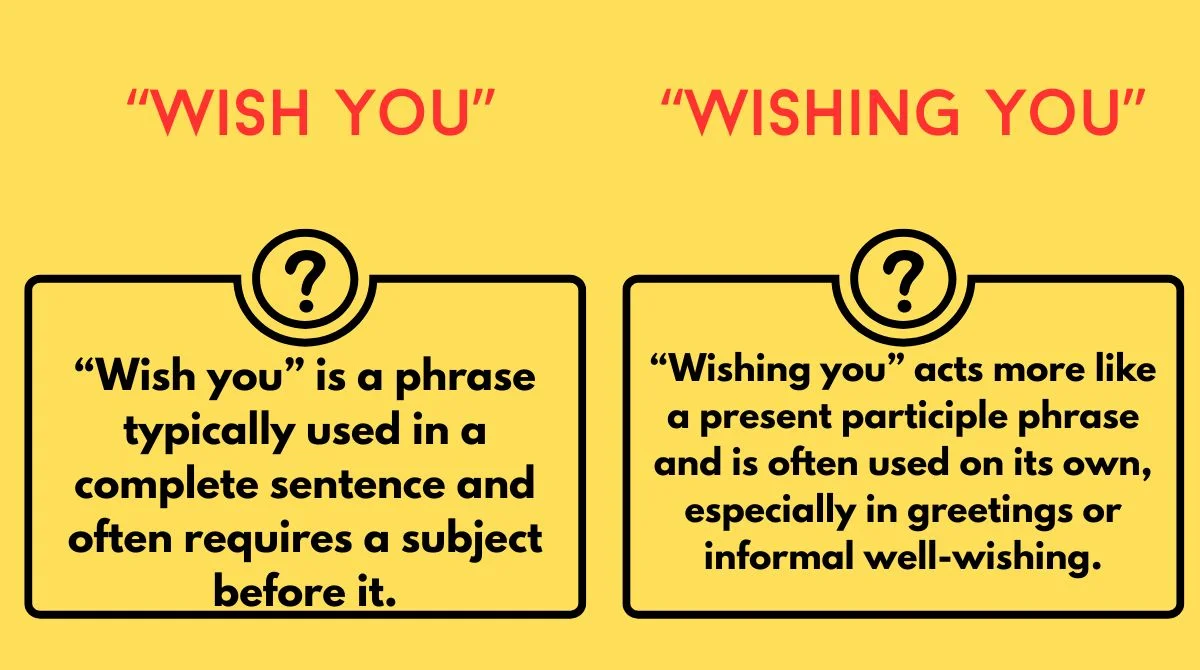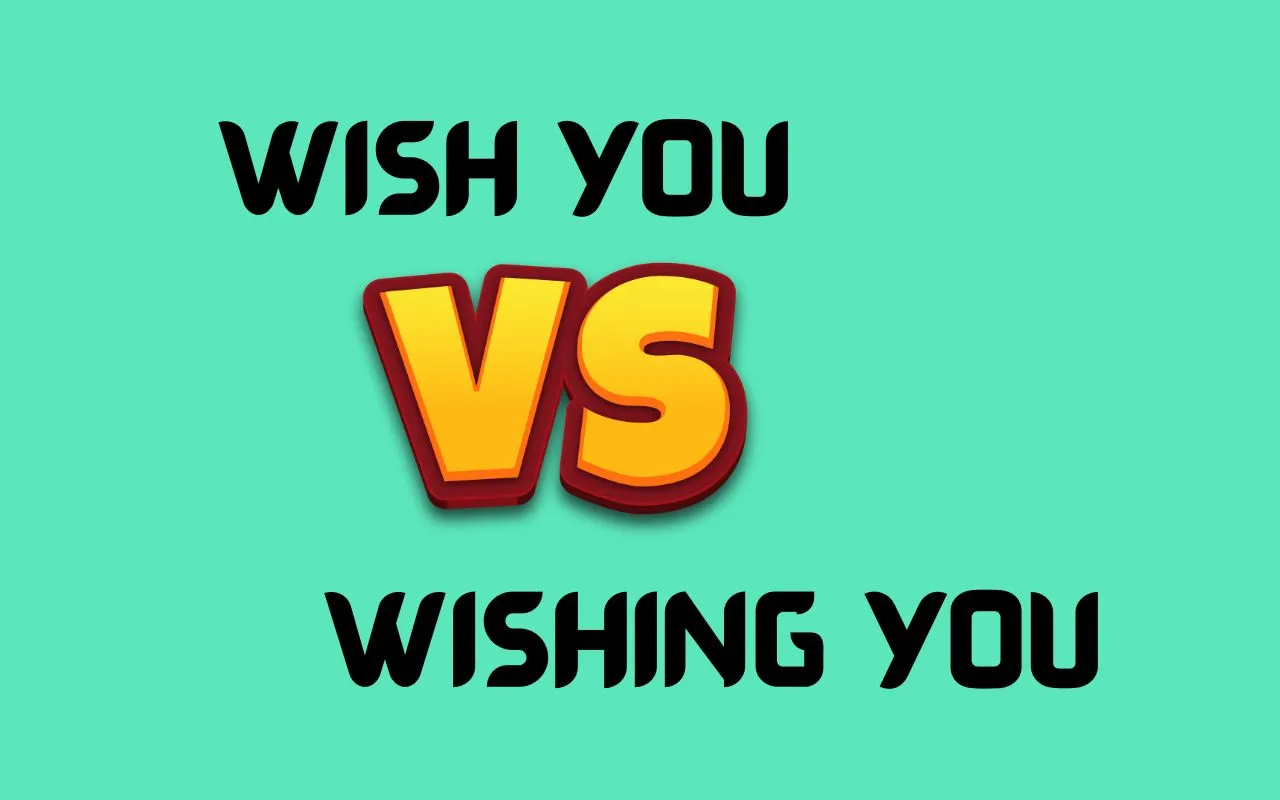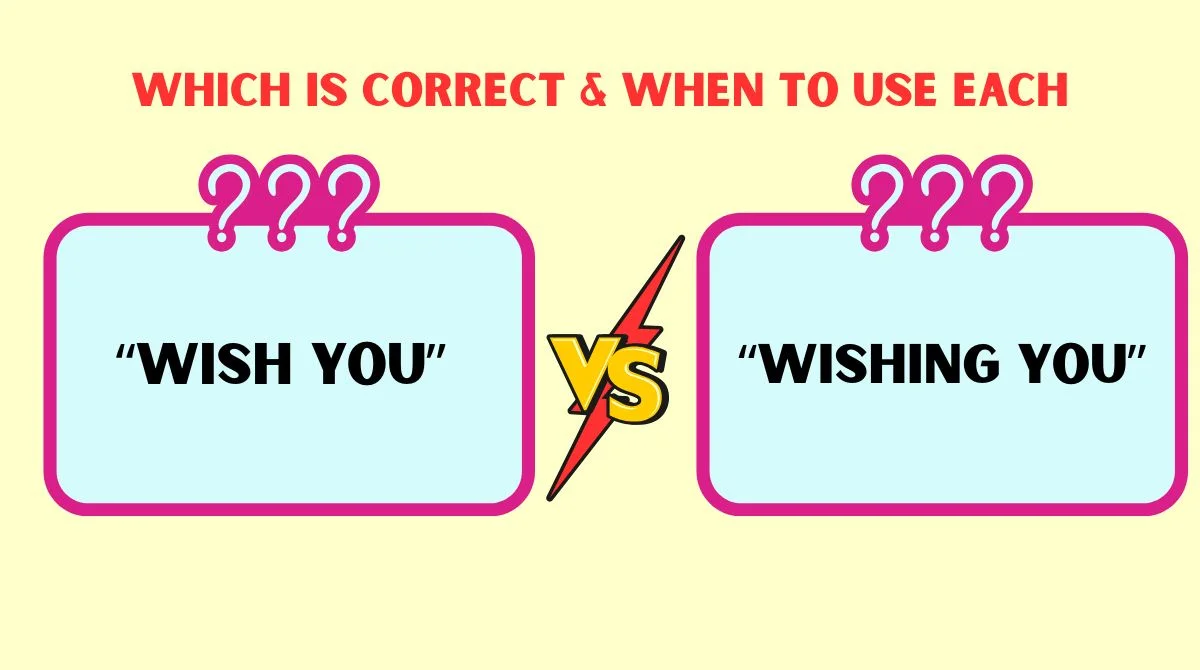Last updated on September 18th, 2025 at 04:08 pm
You’ve probably written a card or sent a message that started with “Wish you…” or “Wishing you…” But have you ever stopped and wondered—which one is correct?
Are they interchangeable, or does one fit better depending on the context?
Let’s dig into the differences between “wish you” and “wishing you,” with clear explanations, examples, and usage tips so you can always send your well-wishes with confidence.
Both “wish you” and “wishing you” are correct, but they aren’t interchangeable. Use “wish you” in complete, formal sentences with a subject (“I wish you success”), and use “wishing you” in casual, standalone messages (“Wishing you all the best!”). Context determines the right choice—read on to see how to use each properly.
Understanding “Wish You” in Everyday Expressions
“Wish you” is a phrase typically used in a complete sentence and often requires a subject before it. It is the base form of the verb “wish,” and it generally conveys a formal or direct tone.
Common Uses:
- “I wish you success in your new role.”
- “We wish you a safe journey.”
- “They wish you all the best.”
Key structure:
Subject + wish + object (you) + complement
This structure is straightforward and commonly used in speech and writing. It appears more formal, making it a better fit for business communication or serious contexts.
Important Tip:
- Without a subject, “wish you” often feels incomplete or grammatically awkward.
- ❌ Wish you a happy birthday. (Incorrect without context)
- ✅ I wish you a happy birthday.

The Nuances and Uses of “Wishing You”
“Wishing you” acts more like a present participle phrase and is often used on its own, especially in greetings or informal well-wishing. It doesn’t always need a clear subject because it implies one (often “I” or “we”).
Common Uses:
- “Wishing you all the best!”
- “Wishing you a wonderful weekend.”
- “Wishing you peace and happiness.”
It’s often used in writing where warmth and brevity matter, such as:
- Greeting cards
- Email sign-offs
- Social media posts
- Wedding or birthday messages
Tone and Style:
- “Wishing you” is warmer and more emotionally expressive.
- Ideal for personal communication or when you want to sound more heartfelt.
Formal Celebrations and Toasts
When you’re writing or speaking at formal events—like weddings, anniversaries, graduations—choosing between wish you and wishing you depends on tone and sentence structure.
Formal Examples with “Wish You”:
- “We wish you a lifetime of happiness together.”
- “On behalf of the company, I wish you continued success.”
More Casual, Toast-style Examples with “Wishing You”:
- “Wishing you joy, love, and laughter today and always.”
- “Wishing you a night to remember!”
Quick tip: When giving a toast or writing a short, emotional message, “wishing you” often feels more natural and celebratory.
Closing Statements in Correspondence
In business or friendly email endings, both phrases can work—but with slightly different vibes.
| Style | Preferred Phrase | Example |
|---|---|---|
| Professional/Formal | Wish you | “I wish you success in your upcoming interview.” |
| Warm/Personal | Wishing you | “Wishing you all the best for the weekend!” |
Email Sign-off Tips:
- Use “Wishing you” to express positivity without sounding stiff.
- Use “Wish you” when your message includes a clear subject and feels more formal.
“Wish You” vs “Wishing You” in Common Greetings
Let’s break down how these two phrases show up in real-world greetings.
| Greeting Type | Wish You | Wishing You |
|---|---|---|
| Birthday | “I wish you a happy birthday.” | “Wishing you a happy birthday!” |
| New Year | “We wish you a prosperous New Year.” | “Wishing you joy and success in the New Year.” |
| Holiday | “I wish you a Merry Christmas.” | “Wishing you peace and joy this holiday season.” |
| Farewell | “They wish you a safe journey.” | “Wishing you all the best on your travels!” |
Takeaway:
Use “wish you” when the sentence includes a subject. Use “wishing you” when writing a standalone wish or greeting.
The Popularity and Appropriateness of “Wish You” and “Wishing You”
You might wonder: Which one do people use more often? And Which one sounds more natural today?
Here’s what usage trends and stylistic preferences suggest:
“Wishing You”:
- More commonly used in cards, emails, and spoken well-wishes.
- Seen as more emotionally resonant and casual-friendly.
“Wish You”:
- More structured and found in formal writing or professional settings.
- Slightly less common in modern informal language.
Expert quote:
“Wishing you has become the go-to for personal messages because it feels more open, hopeful, and emotionally in tune with modern communication.” — LanguageStyle.org
Insights From Google Ngram Viewer
Using the Google Ngram Viewer, we can analyze how frequently “wish you” and “wishing you” have been used in published books over time.
Key Findings:
- “Wish you” had higher usage throughout the 19th and early 20th centuries.
- “Wishing you” began gaining popularity in the late 20th century.
- Today, both are still in use, but “wishing you” is increasingly favored for informal, expressive writing.
Contextualizing Your Well-Wishes
Choosing between wish you and wishing you depends entirely on the situation. Ask yourself:
- Who am I writing or speaking to?
- Is the tone formal or casual?
- Is it part of a complete sentence or a standalone greeting?
Here’s a quick-reference guide:
| Context | Use “Wish You” | Use “Wishing You” |
|---|---|---|
| Business Emails | ✔️ | ✔️ (if warm/friendly) |
| Wedding Toast | ✔️ (structured speech) | ✔️ (for personal touch) |
| Greeting Card | ❌ | ✔️ |
| Social Media Post | ❌ | ✔️ |
| Academic/Professional Writing | ✔️ | ❌ |
Different Scenarios and How to Choose the Right Phrase
Let’s walk through a few real-life situations:
Scenario 1: Job Interview Follow-Up
- ✅ “I wish you all the best in your interview.” (formal)
- ✅ “Wishing you good luck tomorrow!” (friendly and supportive)
Scenario 2: Holiday Card
- ❌ “Wish you a Merry Christmas.” (missing subject)
- ✅ “Wishing you a Merry Christmas and a joyful New Year!” (perfectly warm)
Scenario 3: Office Farewell Email
- ✅ “I wish you every success in your next role.” (professional tone)
- ✅ “Wishing you all the best in your new adventure!” (collegial and upbeat)
Scenario 4: Wedding Message
- ✅ “We wish you both a lifetime of love and laughter.”
- ✅ “Wishing you endless joy and unforgettable memories.”
Both phrases work—you just have to match the vibe to the occasion.

Faqs
Which is correct: “wish you” or “wishing you”?
Both are grammatically correct, but the usage depends on the sentence structure. “Wish you” needs a subject (e.g., “I wish you well”), while “wishing you” is often used in standalone greetings.
When should I use “wish you”?
Use “wish you” in formal or complete sentences where the subject is stated. It fits best in business communication, speeches, and structured writing.
What does “wishing you” mean?
“Wishing you” is a participial phrase commonly used to express heartfelt sentiments in cards, messages, or greetings. It implies a subject like “I” or “we” and doesn’t need to be part of a full sentence.
Is “wish you a happy birthday” correct?
Not on its own. It needs a subject to be complete: “I wish you a happy birthday.” Alternatively, you can say “Wishing you a happy birthday!” as a standalone message.
Is “wishing you” formal or informal?
“Wishing you” is generally more informal and warm. It’s great for personal communication, cards, or social media posts, but not typically used in academic or very formal writing.
Can I use “wishing you” in business emails?
Yes, especially in friendly sign-offs. It adds warmth without being unprofessional—for example, “Wishing you a productive week ahead!”
Final Thoughts: Say It Right, Every Time
So, which one is correct—wish you or wishing you?
The answer is: both are correct, but they serve different purposes. Use wish you when writing a full, formal sentence with a clear subject. Use wishing you for personal messages, casual greetings, or heartfelt expressions.
Now that you know the difference, you’ll never hesitate to choose the right phrase in cards, emails, or conversations.
